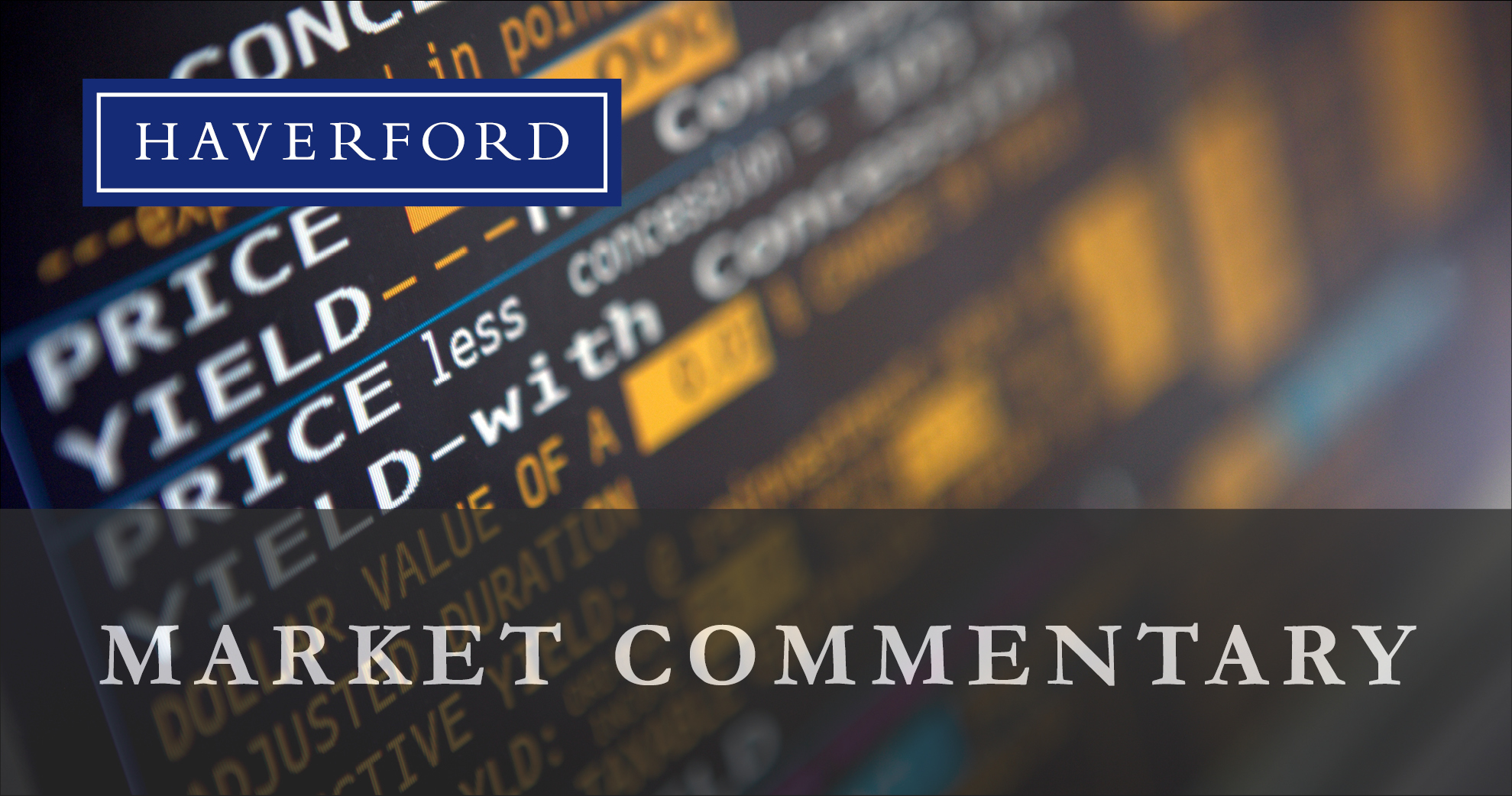Tim Hoyle, CFA, Chief Investment Officer
thoyle@haverfordquality.com
Last week, a collection of economic data points reminded us that inflation concerns have not yet been completely quelled and consumers are still spending at a strong rate. It is widely anticipated that the Federal Open Market Committee will keep interest rates unchanged when they meet later this week, but we expect Chairman Powell to remind markets that rates could again be raised in the future if the data warrants. We also believe Powell will remind the market that “higher for longer” is still a high probability. As of now, the futures market anticipates Fed Funds remain steady until mid-2024, before declining to 4.5% by year-end 2024.
Even if rates remain unchanged in the future, monetary policy is gradually becoming more constrictive as the Fed’s balance sheet shrinks and higher rates permeate the system and alter decision making. Assuming the most likely outcome is steady short-term rates for the remainder of the year, the markets are likely to take their near-term trading cues from how the following narratives develop.
- The UAW strike
The automobile ecosystem as a proportion of the economy is not as large as it once was, but it is still meaningful. A prolonged shutdown will likely be felt in many corners of the economy. The United Auto Workers strike adds to a summer of labor shortages, that according to the Wall Street Journal, resulted in 4.1 million lost days of work in August, the highest monthly toll since 2000[1].
- The government shutdown
According to Strategas’ Dan Clifton, both parties often take blame for shutdowns, and the bipartisan deal to re-open often results in more spending than otherwise would have been the case. He believes a major aspect of the upcoming negotiations will center on the fight over immigration enforcement.
- China
The much-anticipated grand reopening of China’s economy has not delivered the economic growth most expected. Consumer spending has been tepid, and there has been a continued escalation of the economic cold war between Beijing and the West. According to NBC News, Biden and Xi have not spoken since last November. Foreign direct investments in the country have fallen by over 5% this year[2] as businesses look to other parts of Asia for expansion opportunities.
- Consumer spending
Unemployment remains very low and retail sales have been resilient, however, pandemic era savings are soon to be exhausted and student loan repayments are set to divert $100 billion of consumer spending over the coming year.[3] In an economy consisting of $18 trillion it is a relatively small problem on its own, but only adds to inflationary pressures already squeezing many Americans.
- Energy prices
While inflation has come down significantly from its peak, oil prices have risen significantly since June. Rising energy prices add to inflation risks and negatively affect consumer sentiment.
- AI profitability and the cloud
The Artificial Intelligence revolution has been a primary driver of this year’s market gains with billions being spent to build the infrastructure needed to support AI services. Corporate management will be expected to show a return on these investments in the coming quarters. Aside from AI-related demand, Taiwan Semiconductor is growing increasingly nervous about consumer demand.[4]
It is easy to envision a bearish outcome to many of these current events. The bear case is almost always more compelling and easier to articulate. But history has proven that it is more profitable to recognize the fact that successful investing embraces an unknown future.
After holding up well during 2022, quality and dividend-focused investors have had to accept underwhelming relative returns this year. Barron’s highlighted the relative attractiveness of Quality Investing in two recent articles (subscription required).
- Dividend Funds Are Looking Better—Despite Higher Bond Yields
- High-Quality Dividend Stocks Are on Sale. Now Is the Time to Buy.
We broadly concur with Barron’s take. A company able to constantly grow their dividend is an indication of financial strength and strong corporate governance. Investors focused on quality and dividends should feel confident that, despite the economic back drop, these companies can be relied upon to provide dependable, reliable growth.
[1] The U.S. Lost 4.1 Million Days of Work Last Month to Strikes – WSJ
[2] Foreign direct investment in China drops despite efforts to attract overseas capital | South China Morning Post (scmp.com)
[3] Student-Loan Restart Threatens to Pull $100 Billion Out of Consumers’ Pockets – WSJ
[4] TSMC tells vendors to delay chip equipment deliveries, sources say | Reuters
Media Inquiries
Veronica Mckee, CMP
Direct Phone: 610.995.8758
Email: vmckee@haverfordquality.com
Katie Karsh
Direct Phone: 610.755.8682
Email: katie@gobraithwaite.com
Disclosure
These comments are provided as a general market overview and should not be relied upon as a forecast, research or investment advice, and is not a recommendation, offer, or solicitation to buy or sell any securities or to adopt any investment strategy. Opinions expressed are as of the date noted and may change at any time. The information and opinions are derived from proprietary and non-proprietary sources deemed by Haverford to be reliable, but are not necessarily all-inclusive and are not guaranteed as to accuracy. Index returns are presented for informational purposes only. Indices are unmanaged, do not incur fees or expenses, and cannot be invested in directly.
Investments in Securities are Not FDIC Insured · Not Bank Guaranteed · May Lose Value



